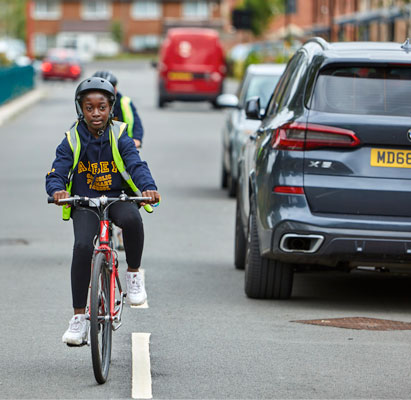Despite the ongoing challenges of coronavirus (COVID-19), cycle training continued throughout 2021. The Trust provided a range of different support to ensure the industry could continue to deliver training.
“We introduced a number of initiatives to support industry in 2021. This funding helped ensure high-quality cycle training continued throughout the pandemic. In addition to Government financial support, the Bikeability Trust launched a Bikeability Restart Grant. This enabled independent training providers to continue operating, despite the challenges of coronavirus (COVID-19).
We also secured a grant per head rise to support training providers and instructors. This recognised the financially unstable year and cumulative lack of funding rise since 2007.”
Alison Orrell, Operations Manager (Grants)

Key Stats for 2020/21 financial year
£12,496,805.40 funding allocated across England by our grants team
| Region | Funding allocated | % distribution allocated | Funding claimed | % distribution paid |
| East Anglia | £ 1,346,022.00 | 11% | £ 787,829.00 | 12% |
| East Midlands | £ 1,190,106.80 | 10% | £ 597,238.80 | 9% |
| North East | £ 734,604.20 | 6% | £ 252,215.20 | 4% |
| North West | £ 2,465,009.00 | 19% | £ 1,190,379.20 | 19% |
| South East | £ 2,154,926.20 | 17% | £ 1,149,008.20 | 18% |
| South West | £ 1,517,210.20 | 12% | £ 933,615.20 | 15% |
| West Midlands | £ 1,703,862.00 | 14% | £ 754,661.00 | 12% |
| Yorkshire & The Humber | £ 1,385,065.00 | 11% | £ 705,696.00 | 11% |
| Total | £ 12,496,805.40 | 100% | £ 6,370,642.60 | 100% |
Key Stats for 2020/21 financial year
£2,101,246.40 additional support for industry during coronavirus (COVID-19)
| Percentage of primary schools in England (excluding London) who received Bikeability in 2020/21 | 23% |
| Percentage of primary schools in England (excluding London) who cancelled Bikeability due to coronavirus in 2020/21 | 16% |
| Number of combined level 1 & 2 places and level 2 places delivered in England (excluding London) in 2020/21 | 93,445 |
| Number of children in year 6 in England (excluding London) 2020/21 * | 553,442 |
| Number of primary schools in England (excluding London) 2020/21 * | 14,982 |
| % of eligible children (year 5 or year 6) in England (excluding London) receiving either L1&2 combined or L2 Bikeability training | 17% |
| % of eligible children (year 5 or year 6) in England (excluding London) booked to receive either L1&2 combined or L2 Bikeability training but cancelled due to COVID | 14% |
* from schools, pupils and their characteristics, academic year 2020/21
Explore education statistics
A brand new website
In September 2021, the brand new Bikeability website launched, the culmination of a six month project. The new website combined the main Bikeability website with the previously separate Professionals website, presented with a fresh, colourful and engaging feel.
The successfully appointed agency, Fifteen Digital, worked closely with the Bikeability Trust communications team to create a seamless, responsive and accessible design.
The website:
• Reflects a new style guide, adhering to brand and tone of voice standards
• Uses plain English throughout
• Is AAA compliant and fully accessible
• Is easy to navigate
• Features high-quality and diverse images

Bikeability and climate change
In 2021, the UK hosted the 26th UN Climate Change Conference of the Parties (COP26) in Glasgow.. The COP26 summit brought parties together to accelerate action towards the goals of the Paris Agreement and the UN Framework Convention on Climate Change. Cycling is an easy, affordable and healthy way to make a big environmental impact. To show this, we calculated the impact that Bikeability has on the planet.
Our research showed that if every child who has taken part in Bikeability cycled to school for a year, it would save almost 1.92 million tonnes of carbon from car-based school journeys. This is enough energy saved to:
• Replace 413,701 gas-powered vehicles for a year
• Save 4,765,834,676 miles driven by gas-powered vehicles
• Power 241,849 homes for a year
• Charge 233,553,880,888 smartphones
It’s the equivalent of
• 83,108,426 bags of rubbish recycled instead of sent to landfill
• 72,769,944 lightbulbs switched to LED
• 31,747,365 trees grown for 10 years







